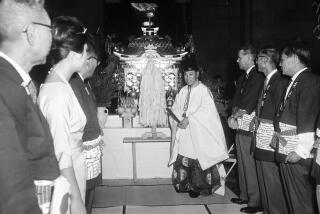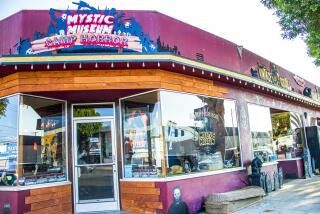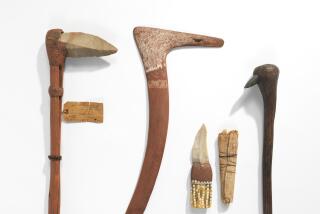Artifacts stashed
- Share via
Re “Stop stealing history,” Opinion, Jan. 29
Caravan loads of treasures were taken away from the ancient sites and centers of pilgrimage on the Silk Route in Central Asia in the early 1900s. Those who removed them and the governments that encouraged them had few qualms. Where the artifacts could not be removed, the local religious fanatics either defaced or destroyed them -- a recent example was the blasting of the centuries-old Bamiyan Buddhas in Afghanistan.
The Diamond Sutra, the earliest known printed book, dated 868, was taken away by Sir Marc Aurel Stein, an archeologist, and is now in the British Museum. A treasure trove of ancient scrolls and manuscripts were carted away from the Dunhuang Caves in China to museums in Europe, Britain and Japan. Thousands of manuscripts yet to be researched lying in the British Museum made their journeys from India, Tibet and China, where they were revered and part of local folklore.
H.N. Ramakrishna
Bangalore, India
Craig Childs’ story of the Tibetan priest (who was able to save only a few precious writings when the Chinese attacked) undermines the very point he wishes to make. Had a museum purchased some of those artifacts before the Chinese incursion, more would be in safe hands today.
The good that public museums and private collectors have done to preserve artifacts that would otherwise have been destroyed is inestimable. Think only of the controversial Elgin Marbles, purchased in a day when the Greek people were in no condition to preserve their own heritage. Whether now is a good time to repatriate those marbles is an interesting question, yet without Earl Thomas Bruce of Elgin, it is likely that this major portion of Greek heritage would have been lost forever.
I think caution and good sense should prevail at all levels -- but in areas of the world where the vicissitudes of poverty and war threaten a people’s heritage, foreign museums and collectors may still have a very large role to play in preserving world culture for future generations.
Blaine Elliott
Orem, Utah
More to Read
Sign up for The Wild
We’ll help you find the best places to hike, bike and run, as well as the perfect silent spots for meditation and yoga.
You may occasionally receive promotional content from the Los Angeles Times.






